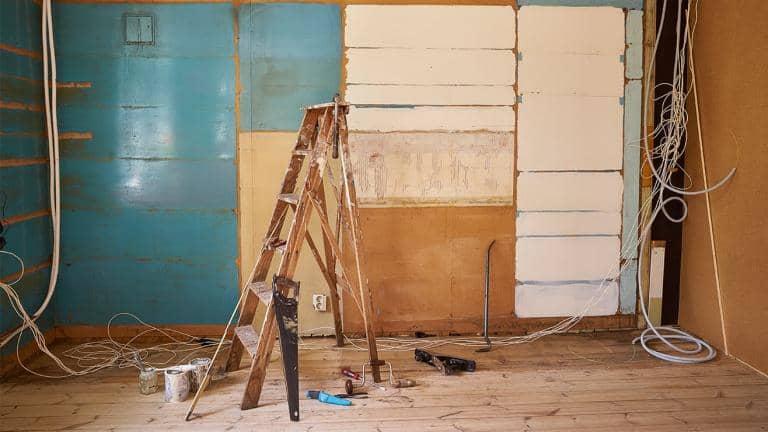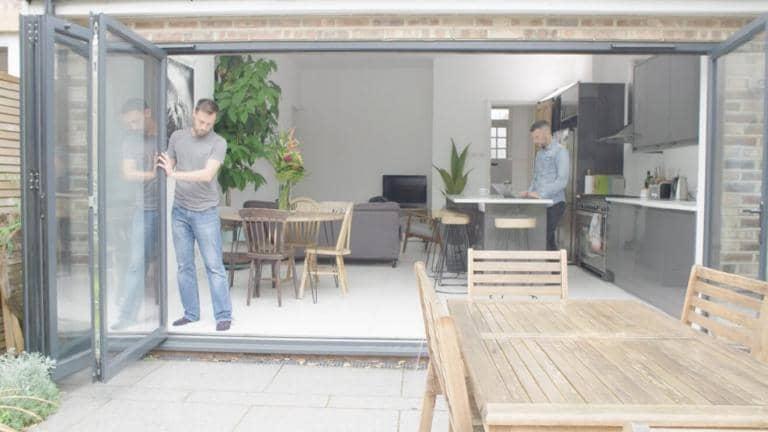

Renovating a house
What you can expect to pay
A quick spruce, spot of surgery or a major restoration? It’s the question faced by any home owner keen to improve their property or create space and – hopefully – add extra value.
The prompts are usually the same: a desperate need for more room (hello kids), better use of layout, a lifestyle upgrade and home refresh, or the cost of moving is simply too high.
Yet the answer isn’t always clear.
Your budget will play a big part, and much will depend on planning rules and your type of property. But whatever your reason for a renovation, it can bring huge joy and often boost the price of your home. To help you decide which renovation route might be right for you, we outline rough costs for six popular refurbishments.
Expert advice from architects, builders and specialists will also give you an idea of how to plan ahead.
Cook up plans for a brand new kitchen
It’s the heart of the home for millions – rather than just a room to refuel, the kitchen is today’s 24/7 hub where you can socialize with friends, stream TV and catch up with your family. No wonder it’s one of the most popular spaces owners choose to supersize.
If you’re looking for more than new worktops and a funky splashback to give it a shine, an extension into either a garden or side passage may be possible. As a rule of thumb, for a budget single-storey build, expect a quote of £1,000 to £1,600 per square meter, according to HouseholdQuotes.
This only covers the cost of the shell of the extension, though – you’ll need to add on extra for your fixtures and fittings plus more for plumbing if you plan to move the layout around.
For a full kitchen renovation, Checkatrade estimates average bills to come in at around £11,200 – and ranges from £6,200 at the lower end, to £16,800 for a more luxurious finish.
Of course, depending on your design and preferences, prices can rise hugely. No room to extend? One option could be to knock down walls to create a highly usable open-plan space. Again, layout will be key - especially if you’ve load-bearing walls.
A renovated kitchen “will not only make your home a more pleasant place to live but increase its value significantly” says Brian Berry, chief executive of the Federation of Master Builders.
“Better still, these projects take no time at all, so the hassle factor is kept to an absolute minimum.”
Switch up your bathroom from blah to spa
It might be one of the smallest rooms in your home – but a bathroom’s regular use means a smart makeover can have the biggest impact. Whether it’s sleek lines, recessed shelves or rainfall showers, an up-to-date bathroom can inject a dose of modern comfort to your home.
Depending on the property, it could also add up to five percent to your home’s value, say specialists at UK architect service company Resi – it estimates a typical new bathroom costs between £2,500 and £6,000. Charles Bettes, managing director at architect GPAD London, says a successful bathroom renovation involves attention to detail.
“To achieve a bathroom with a contemporary feel, without it being too stark, stick to clean lines, and warm and subtle shades with the occasional pop of colour,” he advises.
Crowded downstairs? Consider a conservatory
Hundreds of years ago, they were originally designed to protect citrus fruits from the rain and cold British weather.
Today, the modern conservatory is a go-to for immediate extra living space as it can be a clever – and cost-effective – way to add room and light to your home.
Your budget will largely determine what you get for your money – and size, style and materials will play a part. Prices tend to start from £5,000 (but can typically rise to £30,000 or more) and could bolster your home’s value by between five and 10 percent, according to specialists at Homebuilding & Renovating.
Try to keep the conservatory as much in style with your property as possible, so it feels like an integral part of your home. Dab hand at DIY? You could save thousands with an off-the-shelf lean-to with prices starting from £2,000.
Garage full of junk? Think about a conversion
If an extension isn’t possible but you long for more space, a garage conversion could be your answer. Popular choices include turning it into a large utility room, study or home gym.
What’s possible, and the price you pay, will depend on your garage type – whether it’s integral, single, attached or detached. Since you won’t usually be making big changes to the way your home looks, garage conversions tend to cause fewer planning problems.
And where possible, removing a dividing wall between the garage and indoors can often create a large new open living space. The cost? It can range from £5,000 for an integral single garage to more than £60,000 for a detached double garage.
Of course the price also depends on whether you require structural changes. Plumbing, waterproofing, doors, windows, utilities, insulation and integrating the conversion with the rest of your property, can all cause costs to jump. It could all be worth it, though – a garage conversion could add up to 15% in value, suggest specialists at Homebuilding & Renovating.
Look up to your loft for extra bedrooms
Loft conversions have long been one of the most popular ways to boost your living space (and add value). Their appeal lies in versatility – a loft can create more than one space, says Simply Loft Director Rob Wood.
“With a little guidance, your loft can be transformed into one of the most stylish areas of the house," he says. “On a recent project in London, the conversion resulted in two bedrooms, one bathroom, a small study area and a connecting roof terrace.”
Your vision will depend on budget and any planning permission but you should expect estimates to start from £20,000 with a roof light or Velux conversion. Expect a fair bit of heavy-duty upheaval outside, including scaffolding for builders and a skip for old roofing materials and rubbish.
Can’t go up? Try going down instead…
It’ll likely be big, bold and bring all manner of building mess. But a basement conversion could also be the best way to bring extra value to your home – between 10 and 20% according to most industry estimates.
Breaking ground doesn’t come cheap, though, with all the technical and building expertise needed. Even with an existing cellar or basement, prices are likely to start at around £1,000 per square meter. But if you’re starting a fresh dig, expect to double this.
An architect will play a vital role in such a project, especially with the need for light, underpinning support, waterproofing and any extension beneath your garden.
"A key consideration for underground conversions is lighting," says Stephen Hunt of construction company Kisiel Group. “It’s all about thinking outside the box. Recently, on a large extension, we brightened the lower basement level using a light well in the garden above.”
Be practical and plan ahead
Want extra value? Keep your refurbishment simple but watch for postcode price ceilings…
Turning your property into a home you love is what renovating a house is all about. And while it will improve your lifestyle, it could bring a big financial boost too. If a key aim of your house refurbishment is to raise its market value, do plenty of preparation before you start.
- Get an idea of what your finished project could cost using online tools such as the extension cost calculator from specialist website Homebuilding and Renovating, as well as Checkatrade and Householdquotes. They can also help you get a feel for the typical extra value you could expect to add to your property. It’ll also be worth asking local estate agents for their opinion on how much your refurbishment might add to the price of your home.
- Keep your designs clean and pick plain colours. When it comes to a later sale, you could find your unique decorative taste or passion for rococo style holds you back.
- Your postcode will play a part. Any home is subject to what’s called a ‘ceiling price’ – no matter what improvements you might make, it won’t add any further value because of its geographic location and other prices in the area. If you’re not sure where the limit might be, chat to an estate agent in your area for an idea of returns.
Consult experts early and check for planning permission
Getting the green light for renovating a house is easier with expert help. Talk to local firms for guidance on what could work best for you (as well as what’s advisable to avoid). If you’re struggling, try trade associations such as the Federation of Master Builders or the Royal Institute of British Architects. They can help point you in the right direction, as well as give good general advice.
When deciding who to use for your house refurbishment, always bring up planning permission as a matter of course.
While many smaller projects such as kitchen makeovers or a small conservatory won’t need it, consent is vital for larger home renovations. You’ve also building regulations to consider, and any impact on neighbours such as a party wall agreement for a loft or basement extension. Ask your renovation company to keep you up to speed with all planning approvals, any delays and to loop you in on any queries.
Got your budget? Pay in the way that suits you best
When it’s time to decide how best to pay for the house refurbishment, take a minute to double-check what you can afford.
Home renovations are notorious for running over budget, as the nature of the job often brings with it hidden problems that need solving – at a price. To this end, it can often be a good idea to add on another 10% as a buffer to the amount you think you’ll spend.
Unless you have enough savings to cover the cost of home renovations, you’ll likely look to borrow instead. One way to finance larger home improvements is by borrowing against your home.
If you already have a mortgage with us, you could consider if it’s worth applying to borrow more. Alternatively, you could look at a home improvement loan. And before any work begins, make sure you have the right cover in place.
You should protect your home and what’s in it with building and contents insurance, and call your insurer to tell them about your renovation.
We are not responsible for, nor do we endorse in any way, such third-party websites or their content. If you decide to access any of the third-party websites, you do so entirely at your own risk.
You may also be interested in



Real home-renovation stories
Renovators take us on a tour of their homes
Wanting to move or improve your home and looking for a bit of inspiration? We asked homeowners to share their renovation stories and some easy-to-steal decorating tips.

Improving your home
Transform it into a special place
Whether it’s building a kitchen extension or just painting walls, a refresh could add value to your home and turn it into a place you won’t want to leave.
Funding your improvements

Home improvement loan
Spruce up your property
Whether you’d like a new kitchen or want to give your lounge a new lease of life, you could get more from your home.
Subject to application, financial circumstances and borrowing history.

Credit cards
Whether you want to start a new project, build up your credit score or consolidate your borrowing, there could be a Barclaycard to suit you. Subject to application, financial circumstances and borrowing history.

Mortgage calculators
Work out the kind of mortgage you could afford
Use our mortgage affordability calculators to work out how much you could borrow and what kind of deposit you need for a mortgage.

Additional borrowing
Want to borrow more against your property?
See how we could help you apply for additional borrowing on your mortgage.


